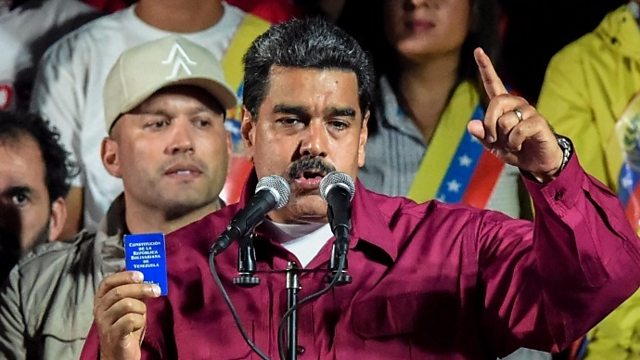
CARACAS, Venezuela (AFP) — Venezuela was facing the threat of fresh international sanctions and intensified domestic unrest Monday following President Nicolas Maduro’s re-election in a vote rejected by the opposition as a farce.
In a further sign of the escalating pressure on Maduro, the 14 countries of the Lima Group, including Argentina, Brazil and Canada, said Monday they were recalling their ambassadors from Venezuela to protest what they said was an illegitimate presidential election.
Venezuela was already isolated and deep in the worst economic crisis of its history, with its people enduring food and medicine shortages that have sparked violent unrest and a mass exodus by hundreds of thousands of people.
Election officials said Maduro won 68 per cent of the votes cast in Sunday’s presidential poll, far ahead of the 21 per cent won by his nearest rival, ex-army officer Henri Falcon.
In an address to cheering supporters outside Miraflores Palace in Caracas, Maduro hailed his victory for another six-year term as a “historic record”.
“We won again! We triumphed again! We are the force of history turned into a permanent popular victory!” Maduro told those gathered to celebrate his “knockout” victory.
But the vote was marred by a 52 per cent abstention rate — a historic high — following a boycott called by the Democratic Unity Roundtable (MUD) opposition coalition, which slammed the ballot as a “farce.”
Even before it took place, the United States, Canada, the European Union and a dozen Latin American countries said they would not recognise the results.
As well as recalling its ambassadors, the countries of the Lima Group said Monday they were summoning Venezuelan envoys in their capitals over Maduro’s win, saying “it did not conform with international standards for a free, fair and transparent democratic process.”
The group highlighted the “deepening” humanitarian and political crisis in Venezuela and the resulting refugee fallout for neighbouring countries, blaming “the loss of democratic institutions, the rule of law and the lack of guarantees and political freedoms.”
Falcon, a loyalist of the late leftist firebrand Hugo Chavez who was neck-and-neck with Maduro in pre-election surveys, said the vote lacked “legitimacy” and accused the government of vote buying.
“For us, there were no elections,” he told reporters. “We have to have new elections in Venezuela.”
And third-placed Javier Bertucci, an evangelist pastor who polled around 11 per cent, also joined the call for new elections.
Maduro may have won, but the near future appears bleak as the country faces economic ruin. The IMF estimates that Venezuela’s GDP will continue to shrink this year, with the inflation rate expected to reach 13,800 per cent.
Venezuela has always relied on its oil, but production has dropped to its lowest level in 30 years despite a recent rise in prices.
“The upcoming scenario is clear: political tension and radicalization, repression, massive international rejection, a sharpening of sanctions, and a climax to the economic crisis,” said analyst Luis Vicente Leon.
Maduro, a former bus driver, union leader, foreign minister and Chavez’s hand-picked political heir, has presided over an implosion of the once-wealthy oil producer’s economy since taking office in 2013.
The socialist leader says Venezuela is the victim of an “economic war” waged by the conservative opposition and external powers including the United States aimed at toppling him. Critics, however, blame him for gross economic mismanagement.
In his victory speech, Maduro acknowledged that “changes” were necessary.
“I will dedicate myself entirely towards economic recovery,” he said, but gave few details.

























